Jordan Peterson Lobster Quotes are taken from his book “12 Rules For Life: An Antidote To Chaos.”
In his “RULE 1- Stand up straight with your shoulders back”, he gave a comprehensive analogy of Lobsters.
Dr. Peterson breaks his points down by putting human beings and lobsters on the same page on many fronts of life.

Get The PDF Of The Book- 12 Rules For Life- An Antidote To Chaos By Jordan B. Peterson Free Here.
Press The Download Button Given Below.
Download Book Jordan Peterson- 12 Rules For Life
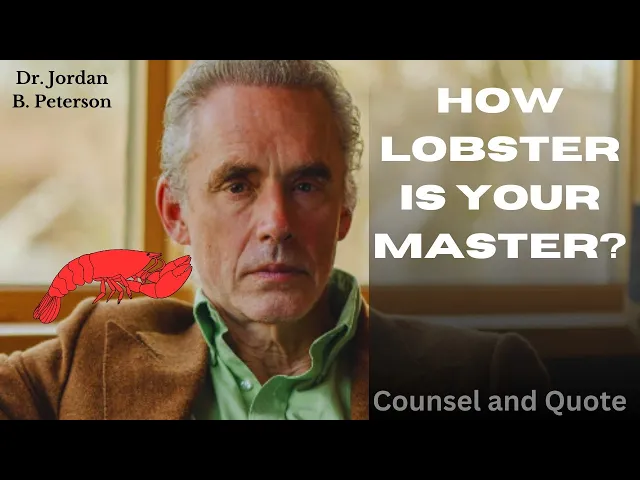
Jordan Peterson Lobster Quotes Video is created specially for you. Please click here and watch.
We have picked his Quotes About Lobsters and have exclusively put them together in an article for you.
Take a look below.
Jordan Peterson Lobster Quotes
1- “If you are like most people, you don’t often think about lobsters, unless you’re eating one.”
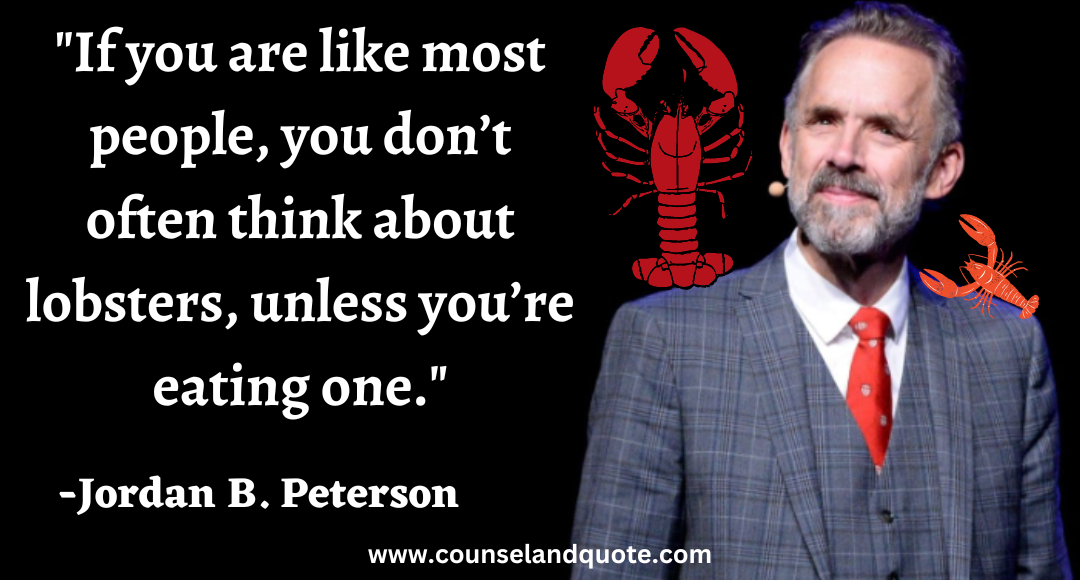
2- “Lobsters live on the ocean floor. They need a home base down there, a range within which they hunt for prey and scavenge around for stray edible bits and pieces of whatever rains down from the continual chaos of carnage and death far above.”
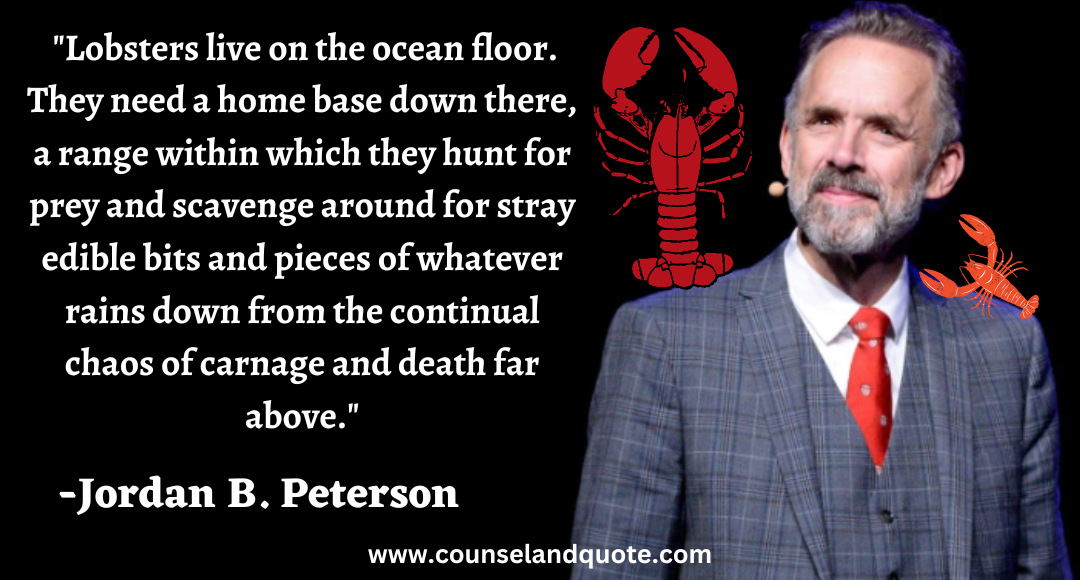
3- “Lobsters have more in common with you than you might think (particularly when you are feeling crabby—ha ha).”
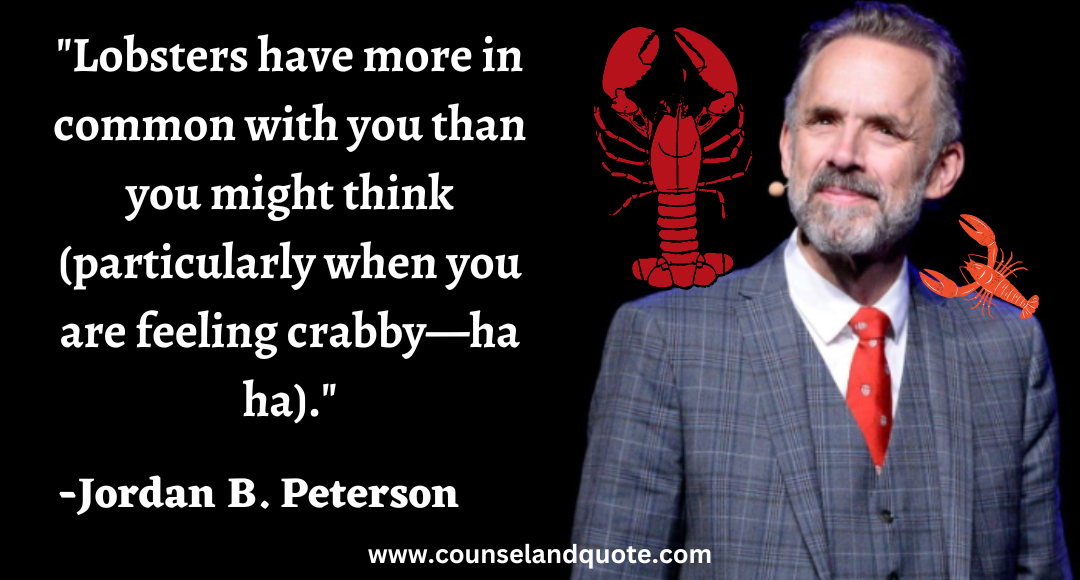
Lobster Jordan Peterson
4- “If a dominant lobster is badly defeated, its brain dissolves. Then it grows a new, subordinate brain—one more appropriate to its new, lowly position. Its original brain just isn’t sophisticated enough to manage the transformation from king to bottom dog without virtually complete dissolution and regrowth. Anyone who has experienced a painful transformation after a serious defeat in romance or career may feel some sense of kinship with the once successful crustacean.”
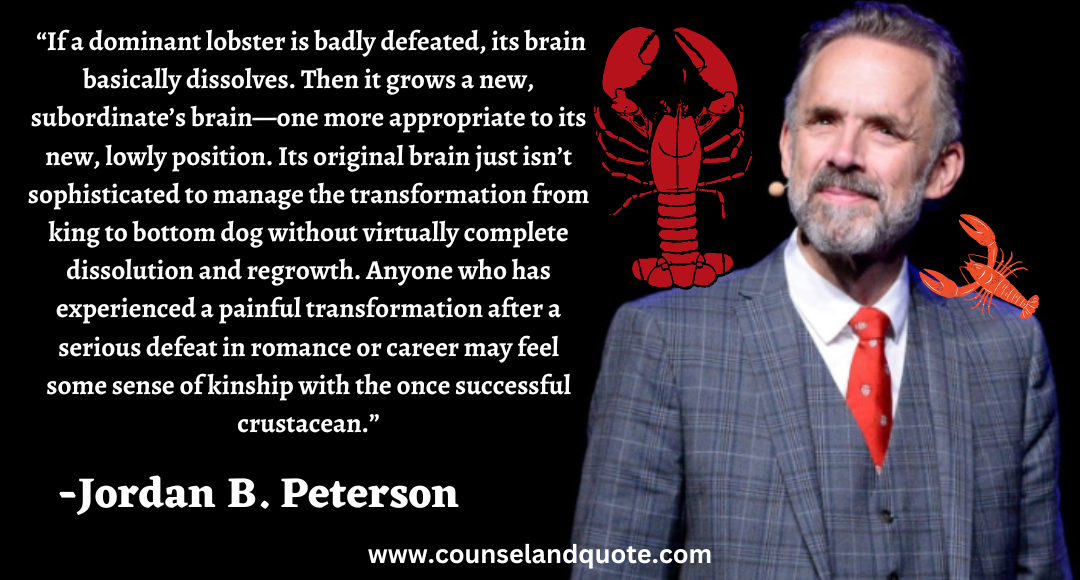
5- “When a lobster that has just lost a battle is exposed to serotonin, it will stretch itself out, advance even on former victors, and fight longer and harder. The drugs prescribed to depressed human beings, which are selective serotonin reuptake inhibitors, have much the same chemical and behavioral effect. In one of the more staggering demonstrations of the evolutionary continuity of life on Earth, Prozac even cheers up lobsters.”
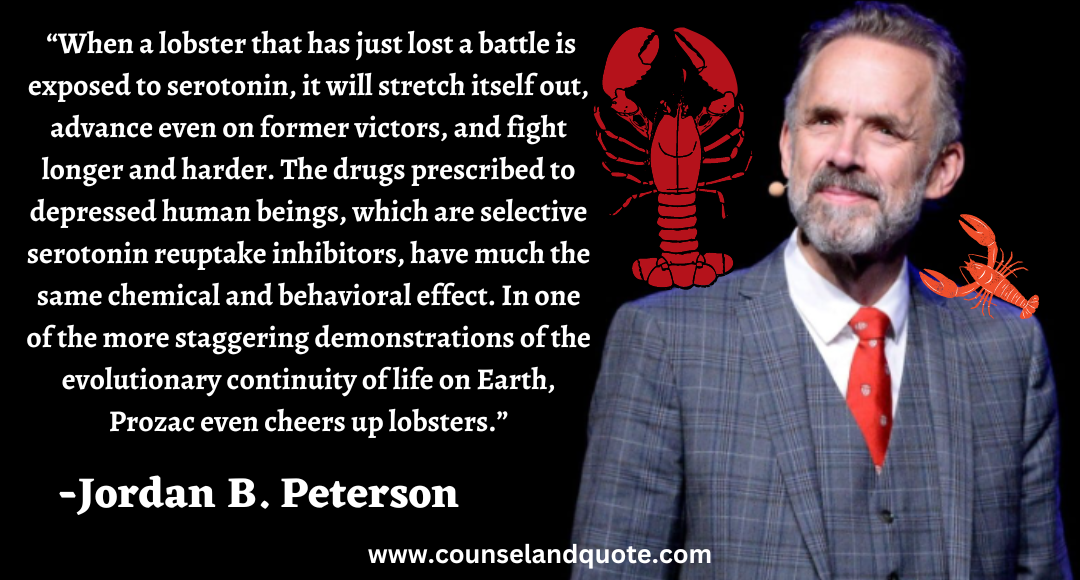
6- “What if there are hundreds of lobsters, all trying to make a living and raise a family, in the same crowded patch of sand and refuse?”
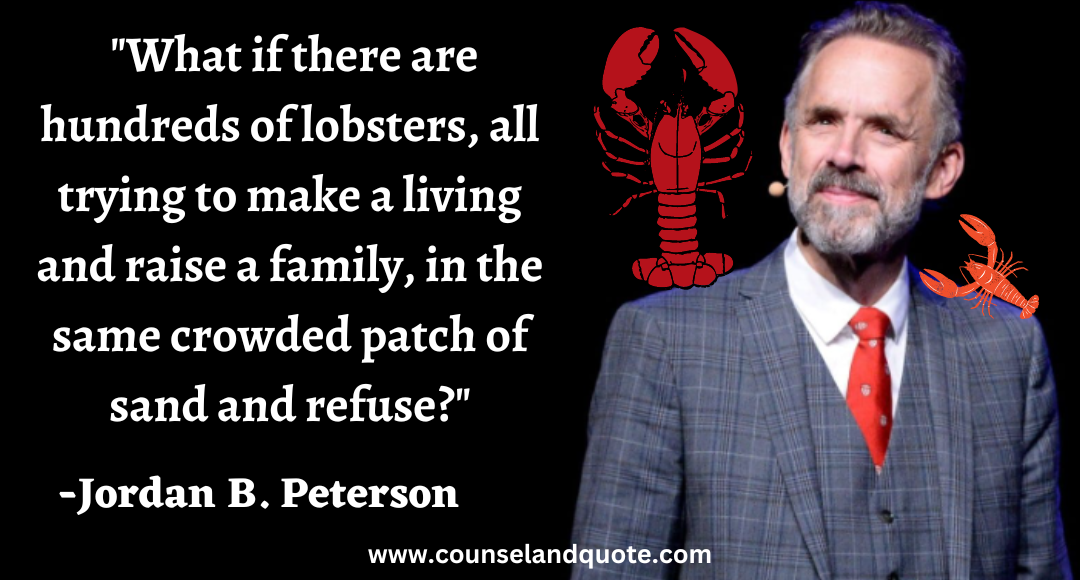
7- “Lobsters, scuttling around on the ocean floor, are no exception. If you catch a few dozen and transport them to a new location, you can observe their status-forming rituals and techniques.”
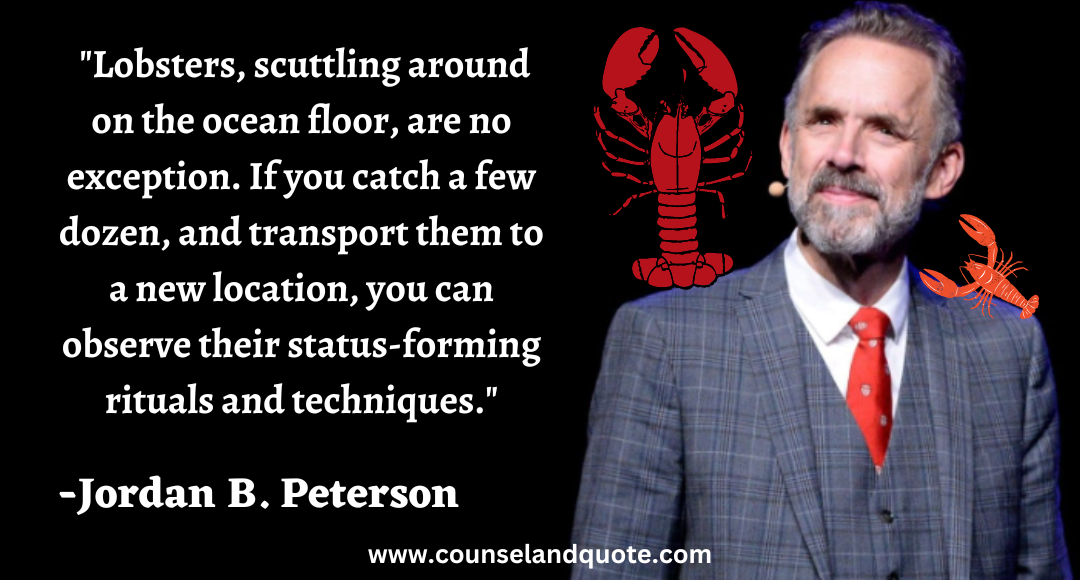
8- “Lobsters learn a lot about where they live, and they remember what they learn.”
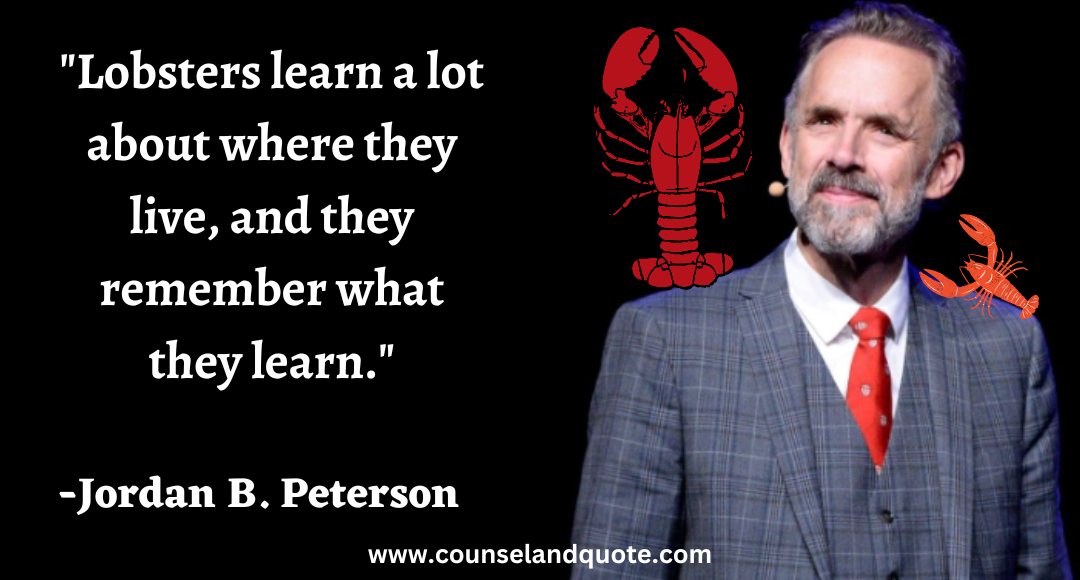
9- “A lobster needs a safe hiding place to rest, free from predators and the forces of nature.”
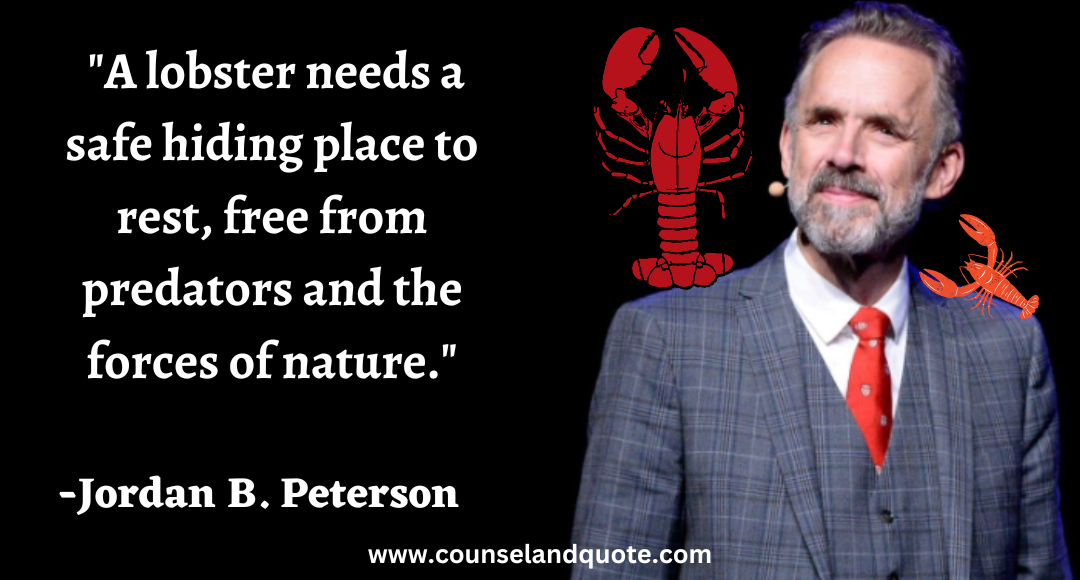
10- “Furthermore, as lobsters grow, they moult, or shed their shells, which leaves them soft and vulnerable for extended periods of time. A burrow under a rock makes a good lobster home, particularly if it is located where shells and other detritus can be dragged into place to cover the entrance, once the lobster is snugly ensconced inside. However, there may be only a small number of high-quality shelters or hiding places in each new territory. They are scarce and valuable. Other lobsters continually seek them out.”
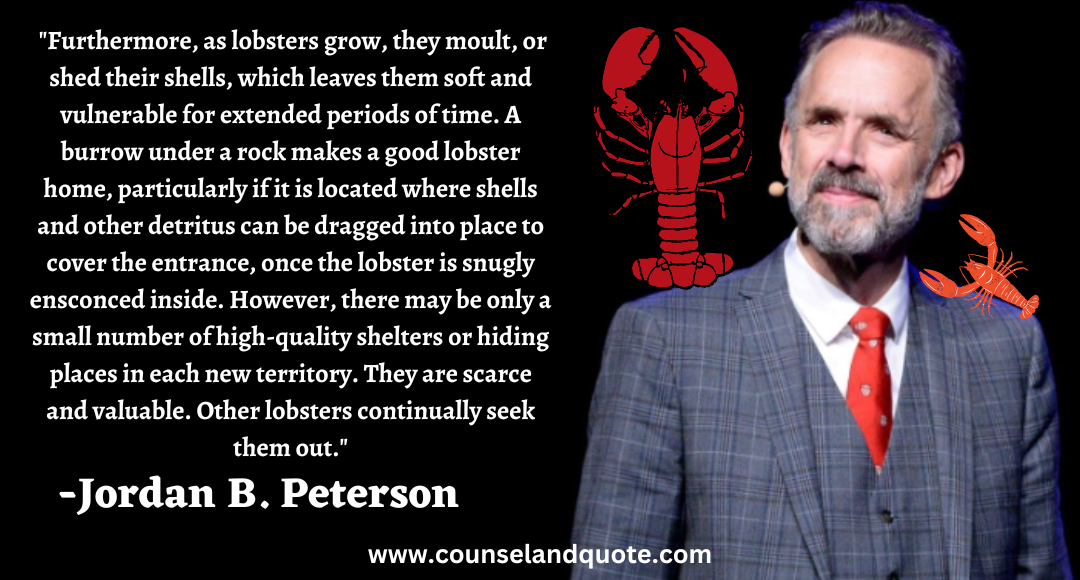
Jordan Peterson Lobster Quotes
11- “Sometimes one lobster can tell immediately from the display of claw size that it is much smaller than its opponent, and will back down without a fight.”
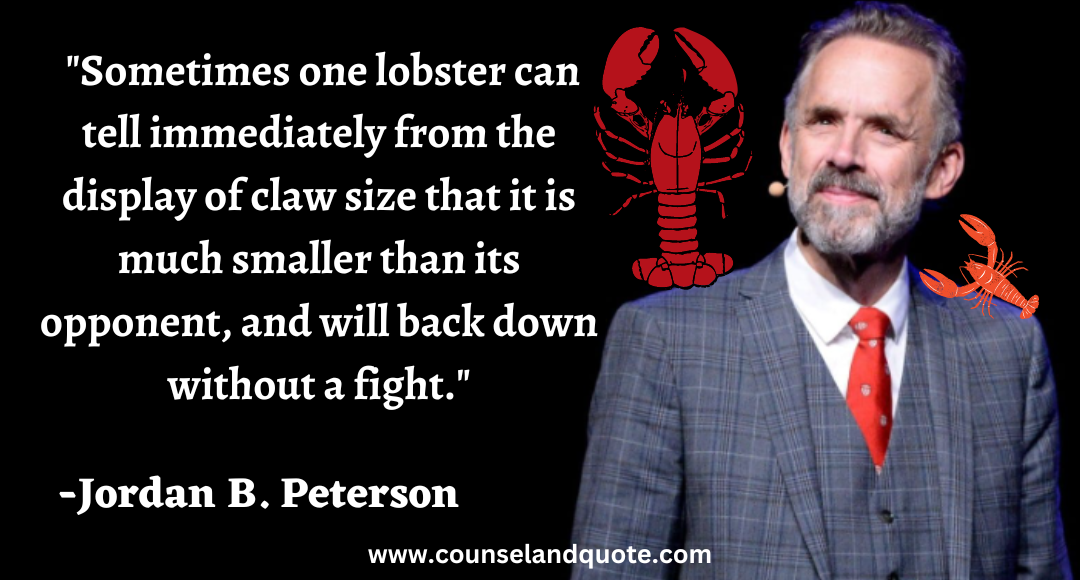
12- “In the aftermath of a losing battle, regardless of how aggressively a lobster has behaved, it becomes unwilling to fight further, even against another, previously defeated opponent.”
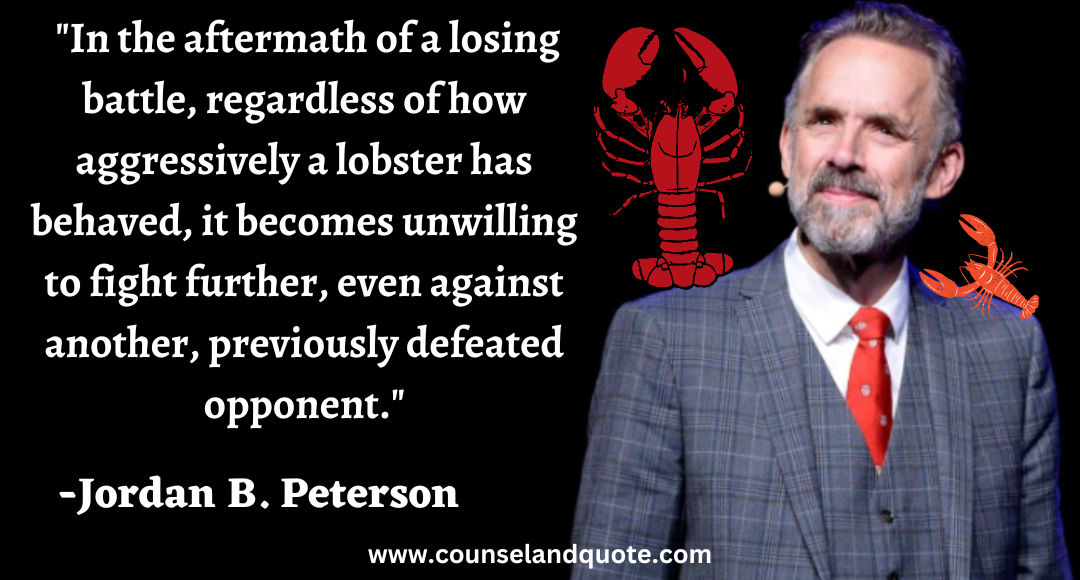
13- “A vanquished competitor loses confidence, sometimes for days. Sometimes the defeat can have even more severe consequences.”
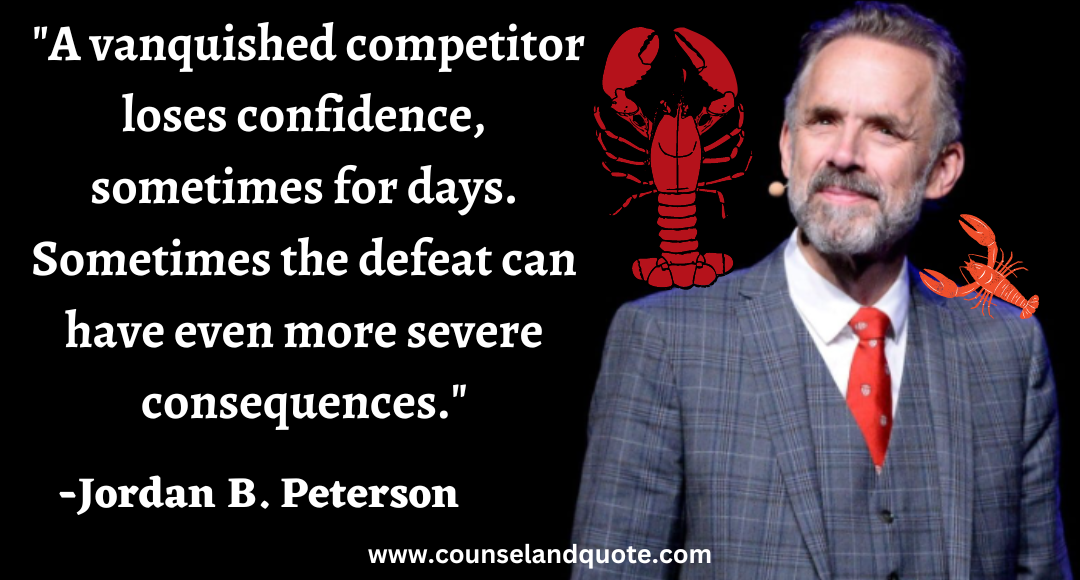
14- “A lobster loser’s brain chemistry differs importantly from that of a lobster winner. This is reflected in their relative postures.”
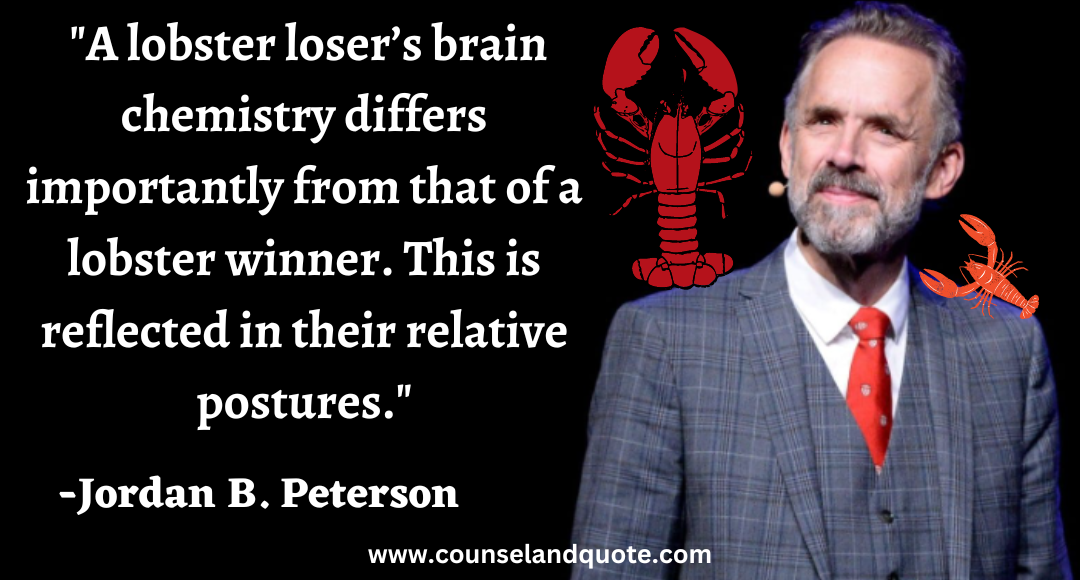
15- “Whether a lobster is confident or cringing depends on the ratio of two chemicals that modulate communication between lobster neurons: serotonin and octopamine. Winning increases the ratio of the former to the latter.”
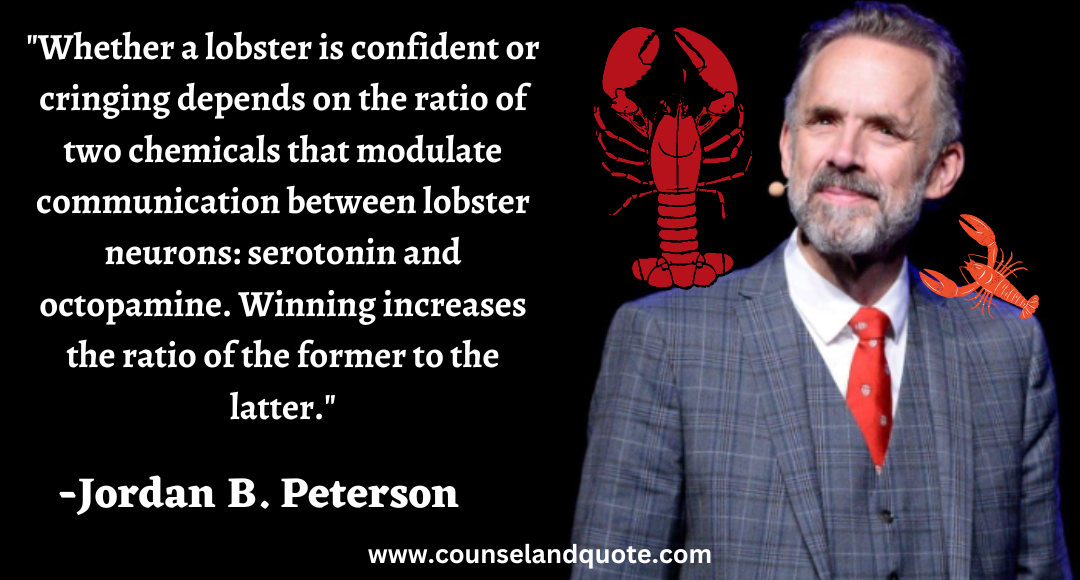
16- “A lobster with high levels of serotonin and low levels of octopamine is a cocky, strutting sort of shellfish, much less likely to back down when challenged. This is because serotonin helps regulate postural flexion. A flexed lobster extends its appendages so that it can look tall and dangerous, like Clint Eastwood in a spaghetti Western.”
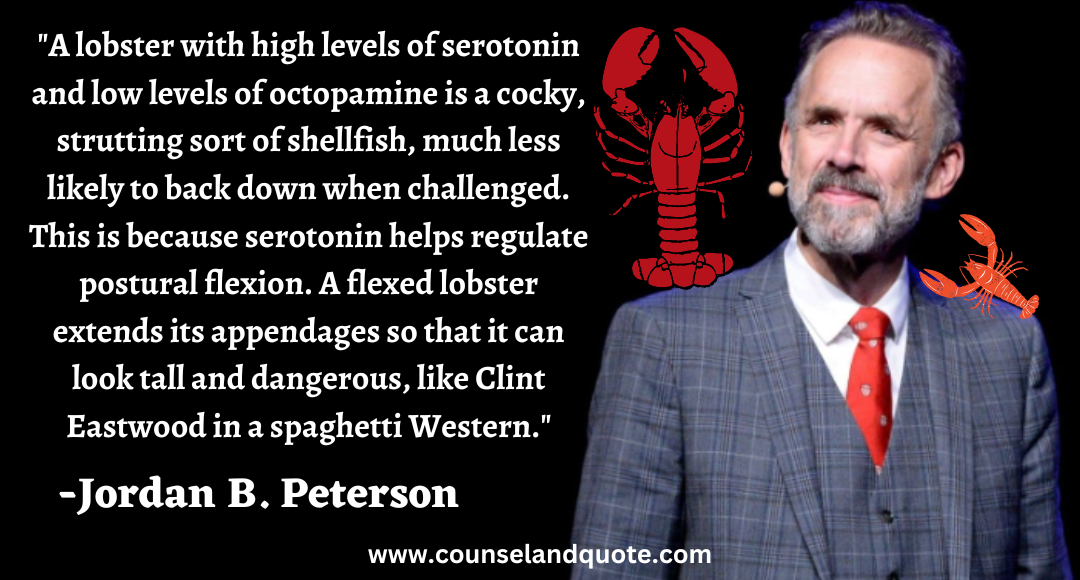
17- “The opposite neurochemical configuration, a high ratio of octopamine to serotonin, produces a defeated-looking, scrunched-up, inhibited, drooping, skulking sort of lobster, very likely to hang around street corners, and to vanish at the first hint of trouble.”
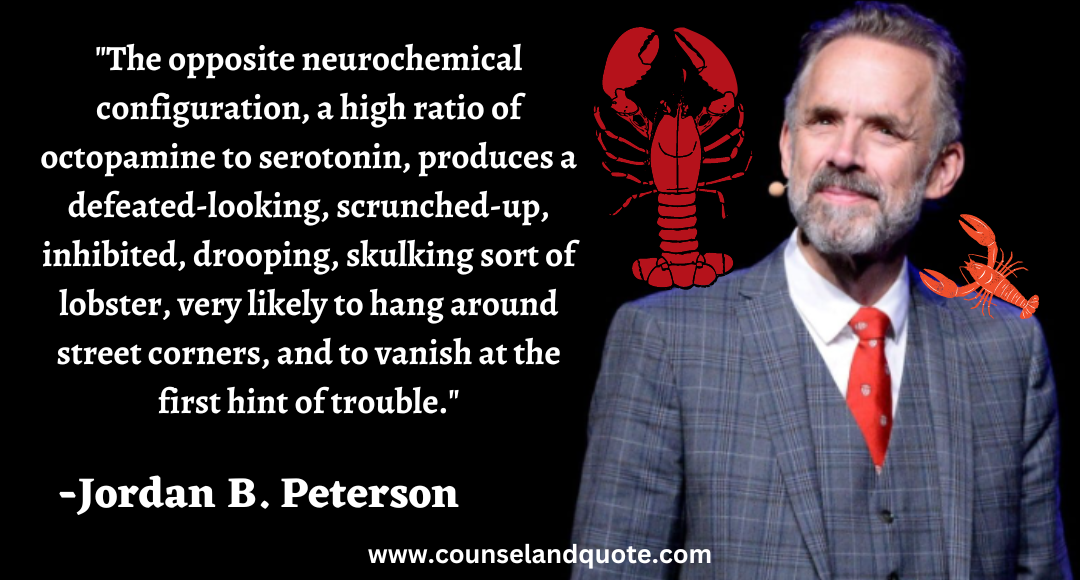
18- “Serotonin and octopamine also regulate the tail-flick reflex, which serves to propel a lobster rapidly backwards when it needs to escape. Less provocation is necessary to trigger that reflex in a defeated lobster. You can see an echo of that in the heightened startle reflex characteristic of the soldier or battered child with post-traumatic stress disorder.”
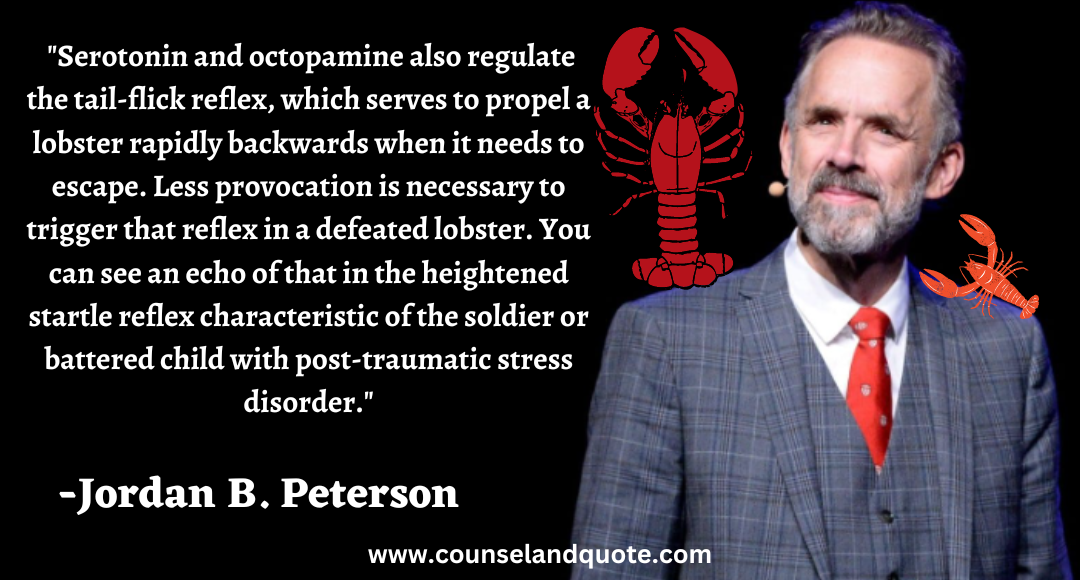
19- “When a defeated lobster regains its courage and dares to fight again it is more likely to lose again than you would predict, statistically, from a tally of its previous fights. Its victorious opponent, on the other hand, is more likely to win. It’s winner-take-all in the lobster world, just as it is in human societies, where the top 1 percent have as much loot as the bottom 50 percent 1—and where the richest eighty-five people have as much as the bottom three and a half billion.”
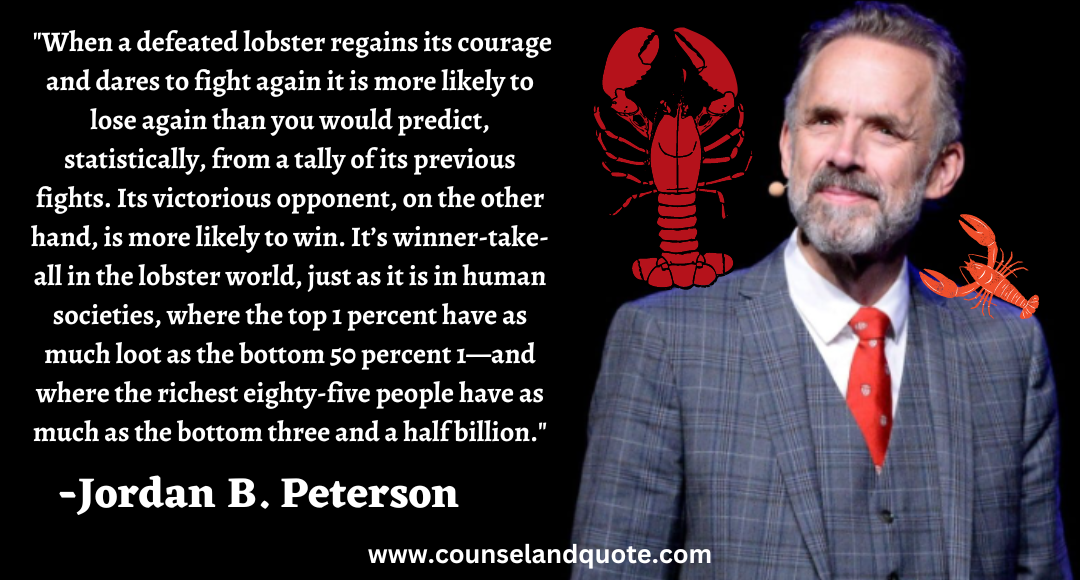
20- “It doesn’t take that long before lobsters, testing each other out, learn who can be messed with and who should be given a wide berth—and once they have learned, the resultant hierarchy is exceedingly stable.”
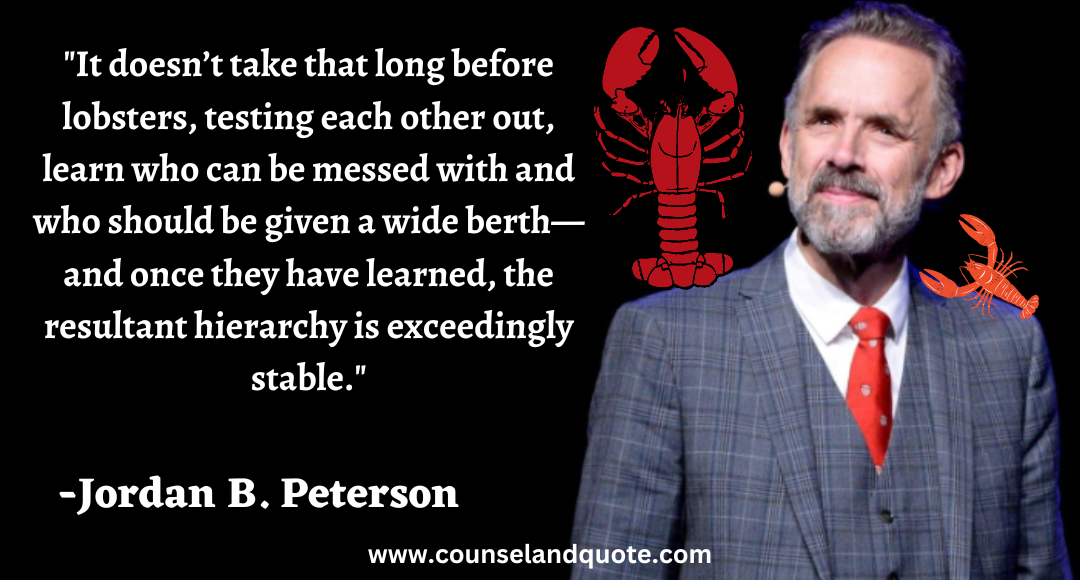
21- “A weaker lobster will quit trying, accept his lowly status, and keep his legs attached to his body.”
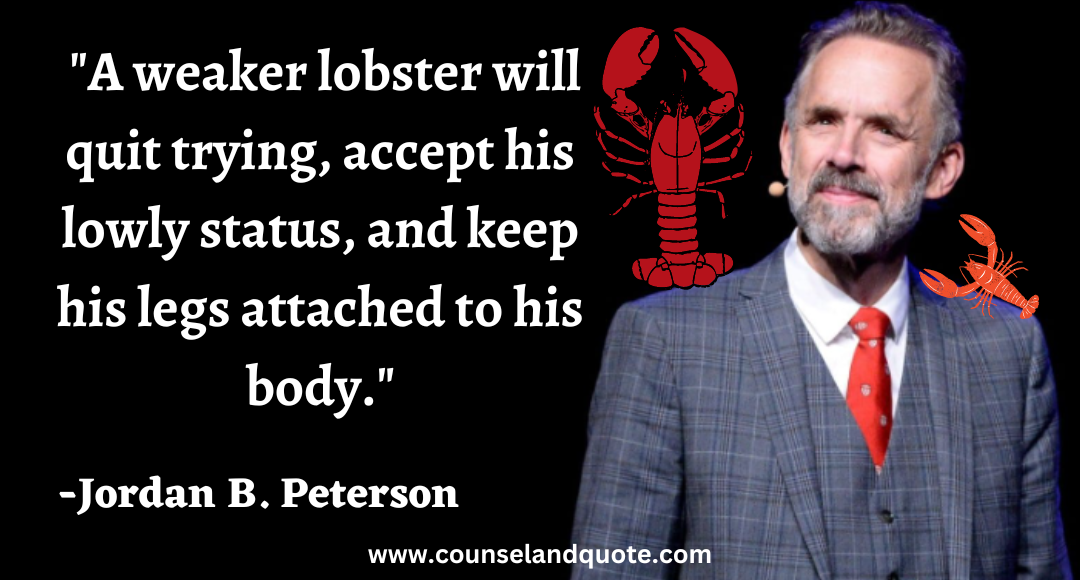
22- “The top lobster, by contrast—occupying the best shelter, getting some good rest, finishing a good meal— parades his dominance around his territory, rousting subordinate lobsters from their shelters at night, just to remind them who’s their daddy.”
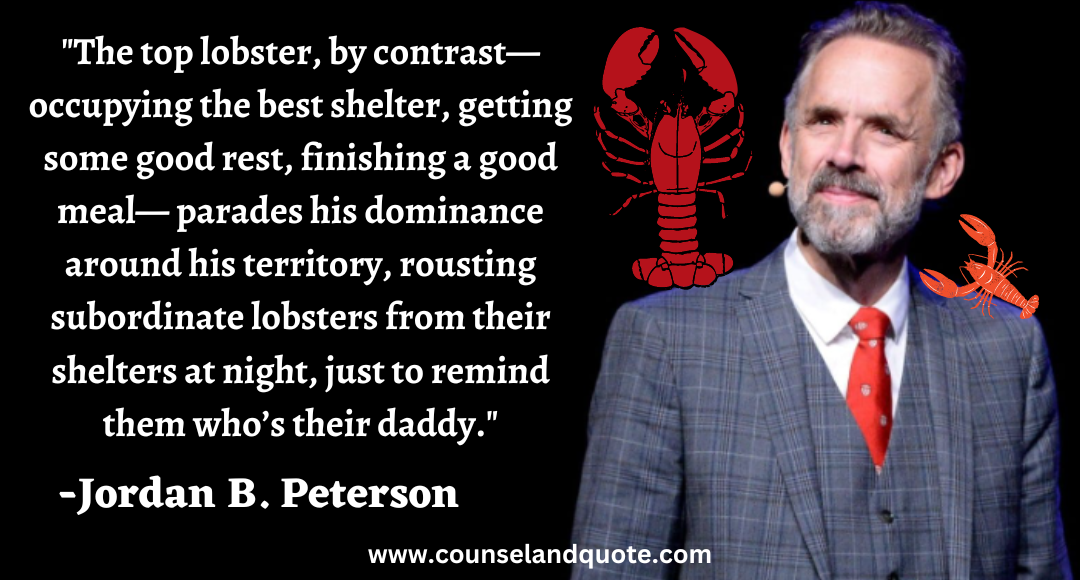
23- “The female lobsters (who also fight hard for territory during the explicitly maternal stages of their existence 14) identify the top guy quickly, and become irresistibly attracted to him. This is brilliant strategy, in my estimation. It’s also one used by females of many different species, including humans.”
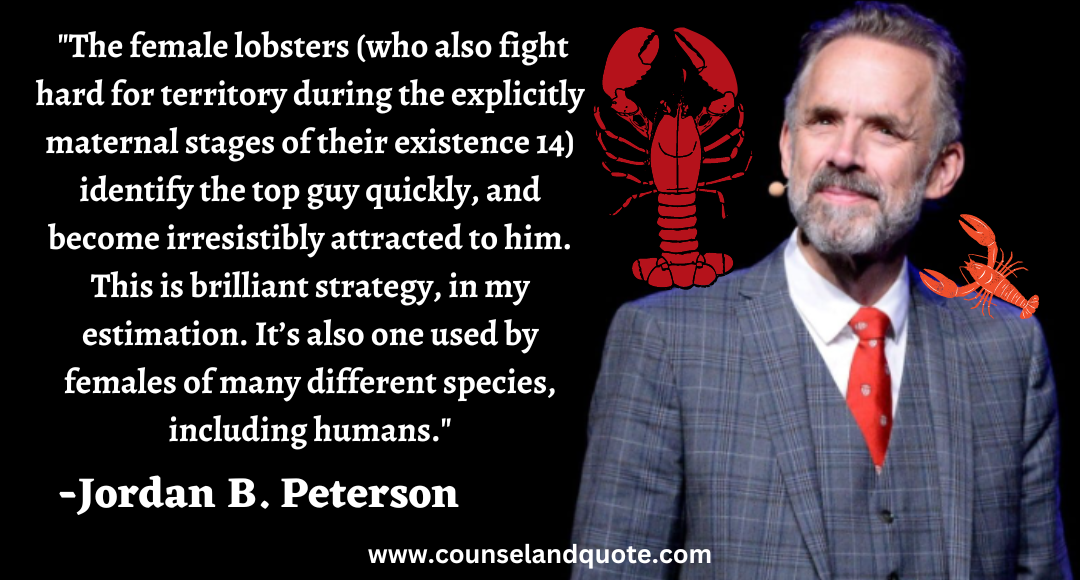
24- “The dominant male, with his upright and confident posture, not only gets the prime real estate and easiest access to the best hunting grounds. He also gets all the girls. It is exponentially more worthwhile to be successful if you are a lobster and male.”

25- “Look for your inspiration to the victorious lobster, with its 350 million years of practical wisdom. Stand up straight, with your shoulders back.”
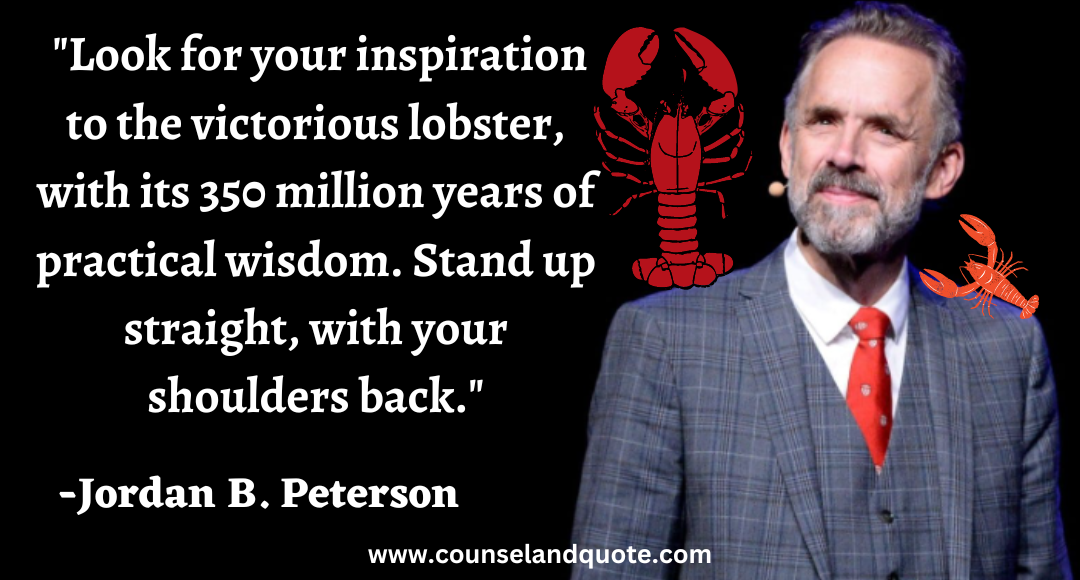
Download Book Jordan Peterson- 12 Rules For Life
Why Jordan Peterson Gave An Analogy Of Lobsters For Humans?
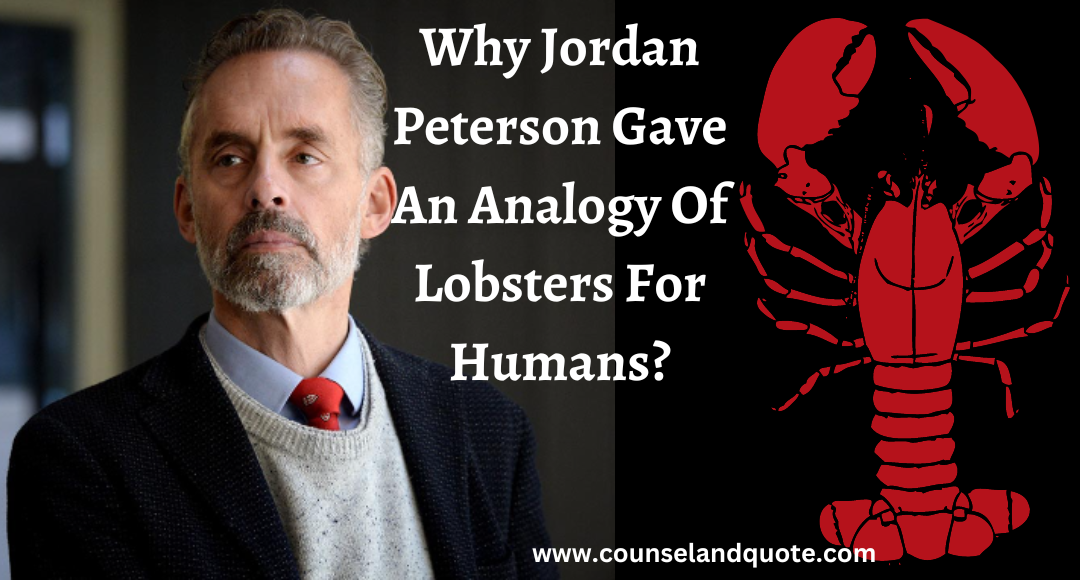
- Lobsters and humans have tremendous similarities in various aspects of life and their attitudes towards each of them.
- Lobsters are tough creatures and aren’t social, so they desire dominance through scavenging and hunting and making their way out, much like humans.
- If a dominant lobster is badly defeated, subordinately it adjusts to its new lower position.
- On the other hand, when a lobster wins, it literally flexes and gets bigger. It becomes broader and is advertising the fact of its dominance.
- Lobster flexes because of serotonergic neurochemicals. It’s the very same chemical, that is affected by antidepressants in humans.
- A defeated Lobster signifies a depressed and defeated human being.
- A winner lobster shares the same set of attitudes and actions as a person who has been given antidepressants lately. Kind of, “standing straight with your shoulders back.”
- If we give defeated lobsters doses of serotonin, they will again be ready to fight with the same zeal and spirit.
- [What Are Jordan Peterson’s 42 Rules For Life?]
Conclusion
I sincerely hope that this article will give you an insight into the hot topic of Lobsters when it specifically comes to Professor Jordan B. Peterson.
Fascinatingly, he gave a wonderful overview by comparing Lobsters with human beings to their optimum similarities.
Kindly inform us of your opinions in the comment section.
I would urge you to circulate this article. By educating through dissemination, you can play a pivotal role in bettering humanity. Please share it with your people.
Spread the word and help the world.
Thank You!
Who is Jordan Peterson?
Jordan Peterson is a Canadian psychologist, professor, and author known for his work on psychology, culture, and political issues.
What is Jordan Peterson’s lobster analogy?
Peterson uses lobsters as an example of hierarchical social structures that are rooted in biology, not just culture.
Where did he talk about lobsters?
In his book 12 Rules for Life: An Antidote to Chaos, specifically in Rule 1: “Stand up straight with your shoulders back.”
Why lobsters, of all animals?
Lobsters have a primitive nervous system and social dominance structures similar to humans, illustrating the biological roots of hierarchy.
What does the lobster hierarchy show?
It shows that dominance hierarchies are ancient and not just human inventions—they go back hundreds of millions of years.
How do lobsters establish dominance?
Through aggressive posturing and fighting. The winner gets better resources, and the loser’s brain chemistry adjusts accordingly.
What’s the key message from the lobster story?
That confidence and status have deep biological roots and shape our social and mental health.
How does posture relate to lobsters and humans?
Peterson suggests that, like lobsters, humans signal their status with posture—standing tall can make you feel more confident and be seen as more dominant.
Does Peterson think humans are exactly like lobsters?
No, he uses lobsters as a metaphor to highlight that social hierarchies are ancient and biologically influenced.
How did people react to the lobster analogy?
It became a viral meme. Some people found it insightful, while others thought it was silly or overblown.
Has Jordan Peterson commented on the meme culture around his lobster talk?
Yes, he’s said he finds it amusing and that it proves how much people resonate with the imagery.

